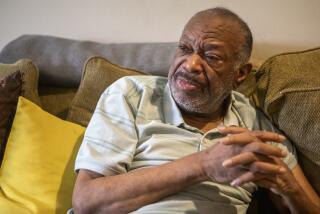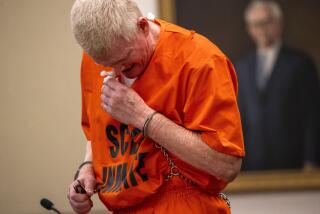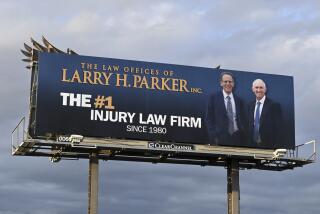James F. Neal dies at 81; formidable lawyer won victories on both sides of courtroom
James F. Neal, a formidable lawyer who won noteworthy victories on both sides of the courtroom — as a prosecutor he sent Teamsters leader Jimmy Hoffa and top Watergate figures to prison, and as a defense attorney he saved film director John Landis and Ford Motor Co. from serious criminal charges — died Thursday at a Nashville hospital. He was 81.
The cause was esophageal cancer, said his longtime law partner, Aubrey B. Harwell.
Neal’s reputation for tenacity and brilliance in the courtroom began with the 1964 prosecution of Hoffa, who had successfully fended off two dozen indictments until Neal, a stocky, cigar-chomping ex-Marine with a Tennessee drawl, was assigned to his case. Hoffa called him “the most vicious prosecutor who ever lived,” a slur that Neal considered a badge of honor.
A decade later, Neal was chief prosecutor in the Watergate case, turning in a virtuoso performance that resulted in the convictions of former Atty. Gen. John Mitchell and top Nixon White House aides H.R. Haldeman and John Ehrlichman.
When he returned to private practice in Tennessee, famous clients sought his counsel, including Landis, who faced manslaughter charges when actor Vic Morrow and two child actors were killed in a 1982 helicopter crash during filming of the movie “Twilight Zone,” and Ford, the first automaker to be charged with murder when the rear-end crash of a Pinto resulted in three deaths.
Neal also successfully defended Dr. George Nichopoulous on charges that he overprescribed medications to Elvis Presley, whose drug use was implicated in his 1977 death.
“I don’t think any lawyer in this era had as many high-profile cases tried as successfully as Jim Neal,” Harwell said Friday. “The real thing that made him different was if he had to work all night to examine a witness, he worked all night. He was totally dedicated and absolutely committed to winning.”
Time magazine wrote of Neal’s unwavering focus preparing for the Watergate trial, noting that he “often put in 10-hour days with a single Watergate witness, then worked on into the night cross-checking each statement.” He was in the midst of one such marathon session with White House counsel John Dean when Dean’s wife broke in to ask about her husband’s reaction to President Ford’s pardon of Nixon that morning. Neal, the magazine reported, asked, “What pardon?”
Born on Sept. 7, 1929, in Oak Grove, Tenn., Neal grew up on a small family farm, where he rose at 4 a.m. every day to perform three hours of chores before school. He earned a bachelor’s degree in 1952 from the University of Wyoming and served two years in the Marines before obtaining a law degree in 1957 from Vanderbilt University. He also had a master’s degree in tax law from Georgetown University.
He was diverted from his intended career as a tax lawyer in 1961, when Atty. Gen. Robert F. Kennedy recruited him to investigate corruption charges against the Teamsters union.
The first case Neal tried against Hoffa ended in a mistrial. The judge suspected Hoffa of bribing a juror, which gave Neal something to work with for the government’s next prosecution.
“Hoffa was the toughest old bird I ever met,” Neal told the American Bar Assn. journal last year. “Every morning I would sit down at the prosecution table, look over at the defense, and Hoffa would shoot me a secret finger message under the table.”
The two trials with Hoffa were as dramatic as an episode of “Perry Mason.” The first trial, in 1962, was interrupted by a deranged gunman who shot up the courtroom with a gas pellet gun. Everyone ducked except Hoffa, who, according to Neal, charged the gunman and punched him in the face.
In the 1964 trial, the drama was supplied by the prosecution’s surprise witness, Edward Partin, secretary-treasurer of a Teamsters unit in Baton Rouge, La., and a confidant of Hoffa. Partin, who had worked undercover for the government during the previous trial, testified that Hoffa had told him he had at least $15,000 to bribe the jury. Hoffa was convicted of jury tampering and received an eight-year sentence.
When special prosecutor Archibald Cox called in 1973 to ask Neal’s help in the Watergate case, Neal was reluctant to leave his private practice in Nashville. He agreed to come to Washington for two weeks to help Cox get started but wound up moving in for a year, unable to resist what he later described as “the fastest game in town.”
His final argument in the trial was so compelling that Haldeman’s lawyer, John Wilson, grimly joked, “Could you hear the prison doors clanking shut?” Wilson, in a Time magazine interview, said Neal was “the greatest lawyer I ever saw in a courtroom.”
In 1990, he defended Exxon Corp. after the Exxon Valdez oil tanker spilled thousands of gallons of oil in Alaska’s Prince William Sound. That trial, which ended in a multimillion-dollar verdict for victims of the spill, was one of Neal’s few big losses, and he hated defeat. “I just shrivel up; instead of 5 foot 8, I become 5 foot 6,” he once said about losing.
Watergate was by far his most important case, but he said that it was the only time a victory made him sad.
“There will only be one Watergate case. Whether a man is a defendant or an unindicted co-conspirator, you’re trying him because you have to prove conspiracy, so you’re trying the president of the United States,” he told People magazine in 1980. “That doesn’t happen very often.”
He is survived by his wife, Dianne; three children; and five grandchildren.
More to Read
Start your day right
Sign up for Essential California for the L.A. Times biggest news, features and recommendations in your inbox six days a week.
You may occasionally receive promotional content from the Los Angeles Times.







